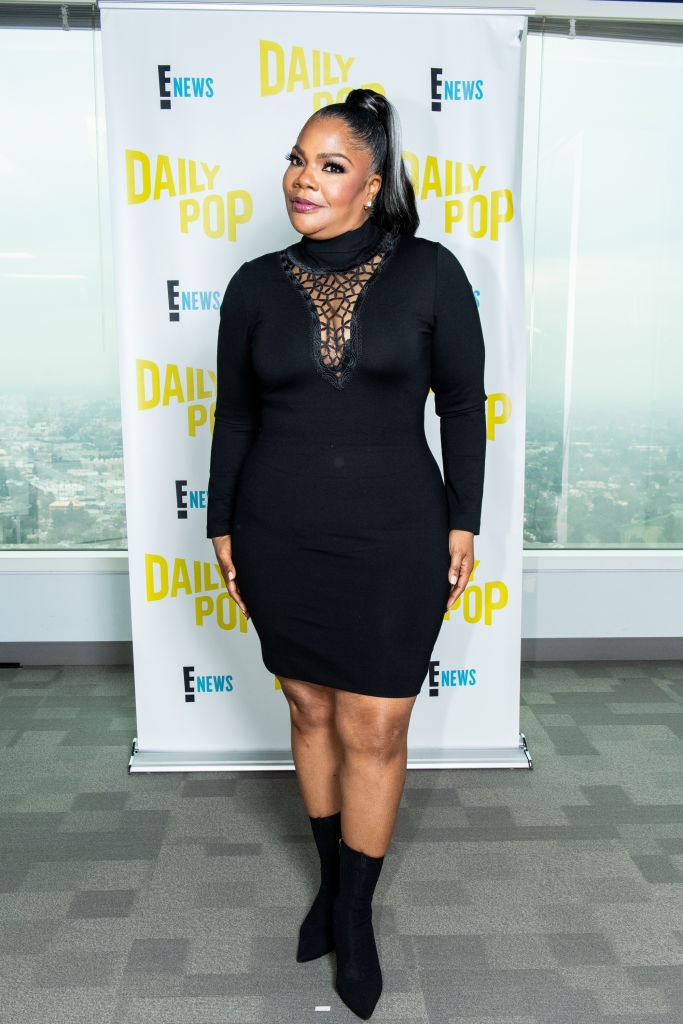
Source: E! Entertainment / Getty
Regardless of the various reasons they’re worn, Black women choosing to wear their hair bonnets in public has been an ongoing topic of debate within recent weeks. Whether for it or against it, all the dialogue makes one wonder when on a societal level we’ll realize that policing Black womens’ bodies doesn’t benefit them or our community.
Now from how it seems, the conversation regarding whether hair bonnets should be worn in public has been popping up everywhere. Last week, we even reported on the rapper Plies tweeting — seemingly jokingly — about how there should be a law against wearing bonnets six feet outside one’s home. Relatedly, this past weekend comedienne and Oscar-winning actress Mo’Nique made headlines for her stance on the debate — which encouraged young Black women to stop wearing bonnets outside as well.
“It took me a minute to say what I’m getting ready to say because I want to make sure I’m not saying it in judgment — and I want to make sure I’m saying it from a place of love,” Mo’Nique said on IGTV this past weekend. Explaining that she’s “honored” by the many online users who think of her as an “auntie” and refer to her as such, she went on to say that she also feels the “auntie” title given to her comes with the responsibility of telling those who look up to her “some real sh*t.”
Amidst the five-minute-long video, Mo’Nique recalled seeing many young Black women in “head bonnets, scarves, slippers, pajamas, and with blankets wrapped around them” to the airport. Noting that it was something she’s noticed generally, whether it be in the store or at the mall, the star said that in her opinion Black women wearing those articles of clothing while out were showcasing a poor representation of the pride that they should have for themselves.
“The question that I’m having to you my sweet babies is, when did we lose pride in representing ourselves?” Mo’Nique asked viewers over the weekend. “When did we step away [from] ‘Let me make sure I’m presentable when I leave my home? Let me make sure I’m representing the family I created so that if I’m out in the street I look like I have pride in myself.’”
“All I’m saying is, could you please comb your hair?” she continued later, before adding, “And if you don’t want to comb your hair — they’ve got enough sh*t out here now baby where you can style yourself up and look like you have pride.”
“I’m not saying you don’t have pride, but the representation that you’re showing — someone would have to ask you to know that you had it.”
Describing the post as “just a warning,” she emphasized that while those dressing in bonnets and slippers outside might have all the pride in the world and care about how they present themselves, it would be more worthwhile for them to dress “like they give a d*mn” for the sake of the betterment of the Black community.
“Queens, don’t walk around with bonnets and headscarves and slippers and pajamas — that’s for the house,” Mo’Nique told viewers. “When you go outside, represent you baby — like you are worthy and you deserve the [greeting] of ‘Hey Queen.’”
Responding to the backlash that the controversial message and tone of her post received, Mo’Nique followed it up with another stream that was posted yesterday (June 1), wherein which she recalled that amidst her own experiences, Patti LaBelle and Margaret Avery didn’t sugar coat anything for her but were able to talk to her in a way that allowed her to “think about things differently.”
“So for you babies that have taken offense to what I said,” Mo’Nique mentioned in the more recent post, “I’m okay with that. I’m okay with y’all being in your feelings about it ‘cause when you love somebody for real I know y’all will get over that. And when y’all say, ‘We will cancel yo ass,’ well, they’ve tried that, and I’m still here.”
Concerning Monique’s comments — and the overall cultural moment that’s brought this conversation to the forefront — at what point will those like her within the Black community choose to stop holding others to societal standards that limit Black people — and Black women especially — from doing and wearing whatever they choose?
While assumably all Black people share experiences of feeling hyper-analyzed by the white gaze and forced to subject themselves to white ideals and standards, how much longer will we allow white supremacist standards of civility and ideas on how people “should behave and represent themselves” to impact how we judge our own?
For many Black women, being under the microscope of Mo’Nique, Plies, and generally, the world at large, is a constant, exhausting, and never-ending practice of trying to be what is considered “acceptable” but always failing to live up to others’ ever-changing demands of being something “good.” When it comes to these topics, good always means “white.” Such as how Mo’Nique stated that young Black women should strive to be good representations of their pride and their communities, the word subtly serves as a measurement of a proximity to whiteness overall.
In addition to never sounding white enough, often not having the Eurocentric features that are widely perceived as the staples of beauty in our society, and being policed by our own regarding what we choose to wear whenever we step out of the door, there’s no room for Black women to put themselves out there authentically and as themselves when our choices are so often reprimanded and underappreciated.
The reality of the situation is that bonnets aren’t really the problem. If someone wants to discriminate against or be prejudice towards a Black woman, chances are it’s due to the color of their skin — not whether or not they chose to wear their bonnet outside of their home.
The whole bonnet conversation is similar to other conversations with the shallowness of respectability politics at their core because quite honestly, it’s just a vehicle for telling others what to do with themselves and holding that power and influence, instead of really having an “issue” with bonnets being worn in public. The people wagging their fingers and saying bonnets shouldn’t be worn outside — or even once the person is out of bed — really don’t even realize that their words keep Black women tied to the harmful and untrue stereotypes often pinned to the people who wear them.
Choosing to wear a bonnet outside isn’t inherently a reflection of a Black women’s low level of pride in herself. If anything, it might in fact symbolize the high level of pride she holds in protecting her hair and/or maintaining her hairstyle. While I do think that Mo’Nique was well-intentioned, she and those with the same line of thinking need to step off of their “auntie” high-horse and be more encouraging of Black women showing up in the world as they individually choose — especially since we’re so often damned if we do and damned if we don’t regardless.
If we truly want Black women to be free, we have to all be on the same page about that meaning that we should and can have the autonomy to do something as simple as dressing ourselves in however we see fit to step outside and tackle the world that faces us.


